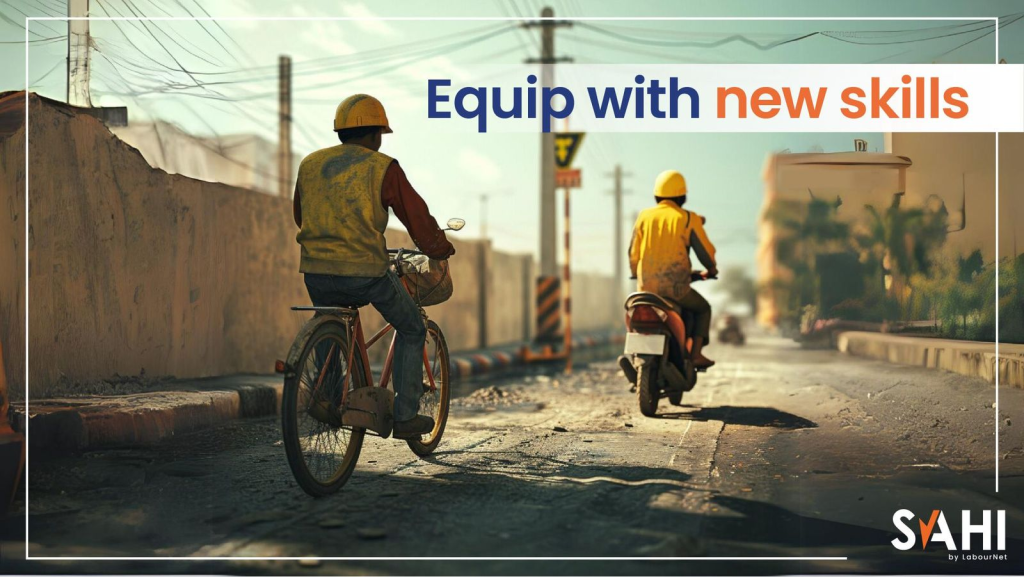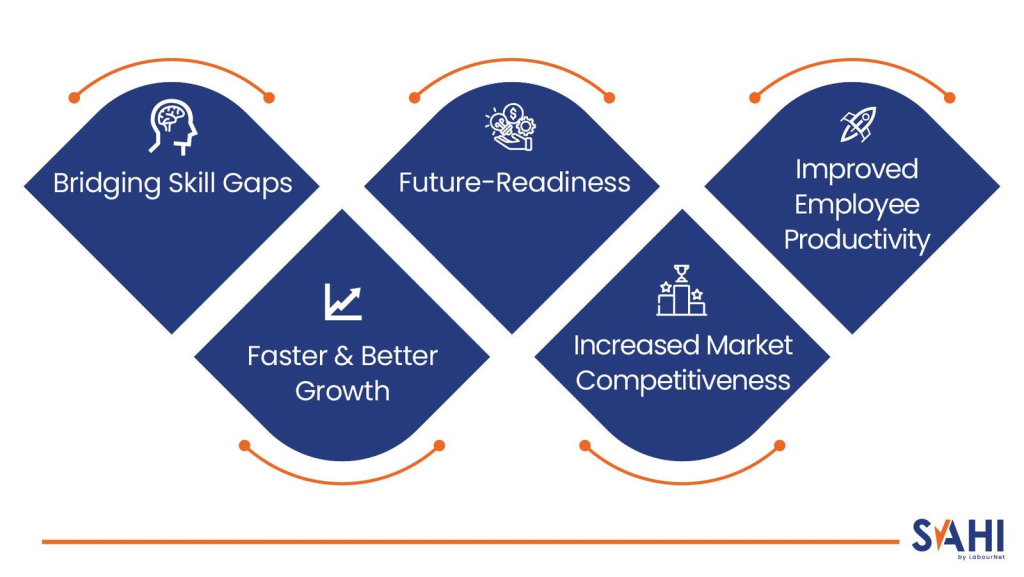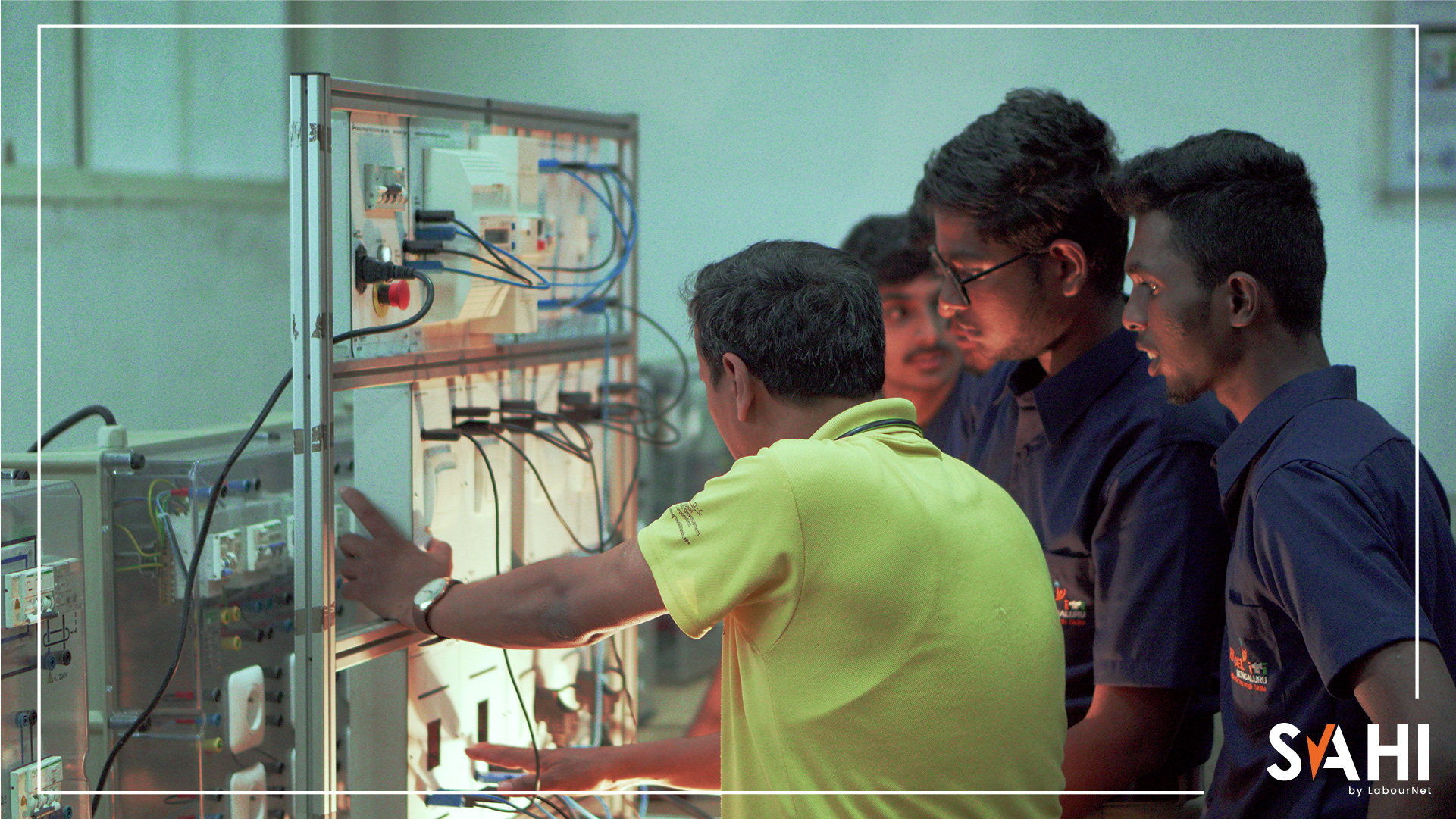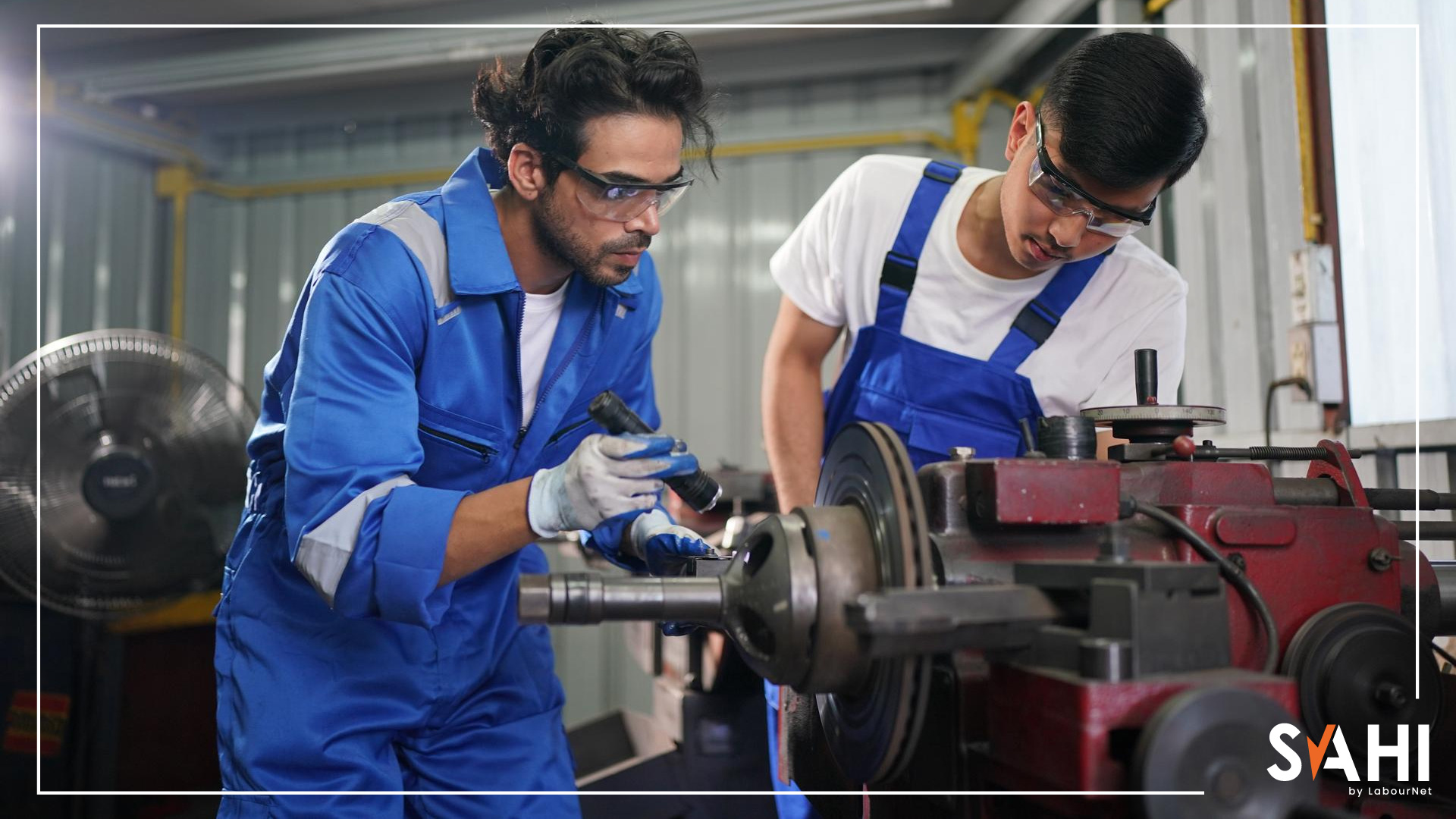The demand for a workforce adept in contemporary skills is increasing in the manufacturing industry.
It’s changing at breakneck speed, adapting to technological advancements and global market shifts.
Amidst this dynamic environment, the significance of skill assessments has surged to the forefront. These assessments are a tool and critical element in understanding and bridging the divide between existing workforce competencies and emerging industry demands.
At the heart of this transformation is employee skills assessment and competency testing.
This innovative approach is redefining how manufacturing entities address workforce development skills. And ensures that the path to manufacturing excellence is not hindered by skill gaps.
The dedication to enhancing employee productivity and work productivity through precise skills assessment tests positions companies uniquely in employability skills development and training solutions in India.
As a result, it’s pivotal in ensuring that the workforce is equipped for today’s challenges while being future-ready.
The Urgent Need for Skill Assessments in Manufacturing
India has taken significant strides towards becoming a global economic powerhouse and a crucial player in this journey has been the manufacturing sector.
More specifically, the technological evolution of this sector has placed India at the forefront of a major innovation. To highlight what we mean, consider the points mentioned in The Wheebox India Skill Report 2023 and Mercer’s India’s Graduate Skill Index: 2023 [1].
It underscores this transformation, revealing a significant improvement in overall employability, especially among young people and women in technology-driven sectors.
This shift highlights an urgent need for robust skill assessments to navigate these changes effectively.
Alongside technical roles, cognitive skills like complex problem-solving and creative thinking are gaining prominence. Thus, indicating a diverse skill requirement in the modern manufacturing workforce.
In this scenario, competency testing and employee skills assessment become crucial for manufacturing entities.
It ensures their workforce is equipped with relevant workforce development skills, driving employee productivity and work productivity.
Providing training solutions and employability skills development is thus more vital than ever. They help bridge these emerging skill gaps, positioning India’s manufacturing sector for future success.
The Skill Gap Challenge: Identifying and Addressing the Disconnect
In the manufacturing sector, the skill gap presents a challenge, stemming from a misalignment between the skills possessed by the workforce and those demanded by evolving industry standards.
This disconnect, often exacerbated by rapid technological advancements, leads to a situation where even a technically proficient workforce may fall short in many areas.
The consequences of such a gap are significant, impacting employee productivity and overall work productivity. Addressing these gaps through effective skill assessments and competency testing becomes imperative.
Employee skills assessment plays a crucial role in identifying these gaps. Such an approach enhances employability skills development while ensuring that training solutions are aligned with the specific needs of the manufacturing sector.
Hence, it bridges the skill gap and boosts workforce development skills.
This strategic alignment is essential for maintaining competitive advantage and ensuring long-term employee productivity improvements in the manufacturing industry.
The Role of Skill Assessments Beyond Traditional Training
Modern skill assessment approaches by organisations like SAHI stand in stark contrast to traditional training methods.
Modern methods offer a more personalised, effective, and measurable way to enhance skills in the manufacturing sector. This chart explores the major differences between modern and traditional training in greater detail.

| Aspect | Traditional Training | Modern Skill Assessment |
| Focus | Generalised skill development | Targeted skill enhancement based on specific gaps |
| Methodology | One-size-fits-all approach | Customised based on individual or team skill assessments |
| Outcome Measurement | Often qualitative and subjective | Quantitative, data-driven competency testing |
| Adaptability | Limited, based on a predefined curriculum | Highly adaptable, evolving with industry needs |
| Impact on Workforce | Broad, often non-specific improvement | Precise improvement in employee productivity and work productivity |
| Role in Career Development | General skill enhancement | Focused employability skills development |
| Relevance | Can become outdated quickly | Continuously updated to reflect current workforce development skills |
| ROI | Difficult to measure | Clear metrics for training solutions, showing direct benefits |
SAHI’s Comprehensive Approach to Skill Assessments
SAHI’s methodology in skill assessments is distinguished by its depth and precision, tailored to the evolving needs of the manufacturing sector.
- Its approach begins with a thorough analysis of the existing workforce development skills, employing advanced employee skills assessment tools.
- This process identifies skill gaps and gauges the potential for employee productivity enhancements.
- SAHI’s technique involves competency testing that is both comprehensive and specific to individual roles, ensuring that the results are directly applicable and actionable.
- Its focus on data-driven insights allows for the creation of targeted training solutions so that every intervention is optimally designed for maximum impact on work productivity and employability skills development.
This meticulous and customised approach places SAHI at the forefront of addressing the complex skill requirements of modern manufacturing.
Tailored Assessments for Diverse Manufacturing Needs
Each sector has unique challenges and skill requirements.
It’s important to recognize this and customise skill assessments to suit the varied needs of different manufacturing domains.
Whether it’s for roles demanding precision or for more traditional skills like welding or assembly, employee skills assessment is designed to be sector-specific.
You must employ competency testing techniques that reflect the actual work scenarios in each sector, ensuring the workforce development skills are directly applicable.
This tailored approach enhances employee productivity and aligns with the specific objectives of employability skills development within each manufacturing sector. Hence, it makes modern training solutions highly effective and relevant.
From Data to Action: Utilising Assessment Insights for Training
The approach to transforming skill assessment data into actionable training strategies brings about a major change in workforce development skills.
This methodology begins with a comprehensive employee skills assessment. In other words, meticulously collecting data that provides deep insights into the current competency levels of the workforce.
This data, rich in details about both strengths and areas needing improvement, is the cornerstone of modern training strategy.
Once the competency testing phase concludes, experts analyse the data to identify specific skill gaps.
This analysis is crucial in customising training modules that target these gaps. By focusing on these identified areas, you can ensure that employee productivity is maintained and significantly enhanced.
In this process, SAHI also considers the evolving trends in the manufacturing sector.
Such foresight ensures that the training is about addressing current gaps and preparing the workforce for future challenges.
For instance, if data shows a need for skills in emerging technologies, SAHI incorporates these into their training solutions, staying ahead of the curve.
Regular Reassessments To Track Progress and Recalibrate The Training
The continuous loop of assessment, training, and reassessment creates a dynamic environment of constant learning and improvement.
It’s more than about employability skills development because the primary focus is on creating a workforce that is agile, adaptable, and ready for both current and future manufacturing challenges.
By translating data into tailored action, SAHI ensures that its approach to skill development in India is grounded in reality and aligned with industry needs. It maximises the return on investment for both the workforce and the employers.
This data-driven, customised approach marks SAHI’s distinction in enhancing work productivity and employee productivity in the manufacturing sector.
SAHI’s Impact in The Manufacturing Sector: Transforming JSW’s Workforce Efficiency
Client Introduction
JSW Group, a leader in manufacturing with interests across various sectors, partnered with SAHI to upskill gig workers to align with modern fabrication methods and advanced technology.
Problem Faced
The primary goal was to enable these workers with skills and knowledge to integrate into the mainstream workforce efficiently.
Solution Provided
SAHI, in collaboration with LabourNet, implemented the Recognition of Prior Learning (RPL) Program. This initiative was designed to assess and upgrade the existing skills of JSW’s associated workers, focusing on modern fabrication techniques and tools.
Job Roles Trained
LabourNet successfully skilled and upskilled 603 employees in roles like distribution sales, IHB fabrication, and engineer upskilling, enhancing their adaptability to modern methods.
What JSW Had To Say
The JSW Team acknowledged the program’s impact, highlighting the transition to modern technology and the resultant benefits in professional growth and productivity.
Result
The partnership with LabourNet and SAHI enabled JSW Group to effectively upskill its workforce, leading to increased productivity and a stronger relationship with its workers.
This initiative underlines SAHI’s commitment to fostering workforce development and aligns with the industry’s progression towards a more skilled, competitive manufacturing sector.
A Cost-Benefit Analysis of Skill Assessments
The return on investment (ROI) from implementing skill assessments is a striking example of cost-effective workforce development.
By pinpointing exact skill gaps through competency testing minimises unnecessary training costs, directing resources to areas that yield the highest benefit.
This targeted training leads to a significant uptick in employee productivity, directly impacting the bottom line. Moreover, as employee skills align more closely with industry requirements, businesses experience reduced turnover rates and lower recruitment costs.
The increased efficiency and adaptability of the workforce translate into tangible financial gains.
As a result, skill assessments are a wise investment with a high return.
Future-Proofing the Workforce by Preparing for Tomorrow’s Challenges
Skill assessments play a pivotal role in future-proofing the workforce for tomorrow’s manufacturing landscape.
By continuously updating competency testing methodologies, you can ensure that the employee skills assessment process is aligned with the latest industry trends and technologies.
This foresight prepares the workforce for current demands and future advancements in manufacturing.
Adaptability is crucial for maintaining employee productivity and work efficiency in the manufacturing sector.
Furthermore, focus on employability skills development extends beyond technical capabilities to include soft skills like problem-solving and creative thinking, which are increasingly important in a technology-driven world.
By doing so, you can address the holistic development of the workforce, ensuring they are equipped to tackle new challenges and opportunities that arise.
The long-term benefits of training solutions in India are clear: businesses investing in a workforce are better prepared to lead in innovation and efficiency.
This gives them a competitive edge in the global manufacturing arena.
Solidifying Manufacturing Excellence with SAHI’s Skill Assessments
SAHI’s comprehensive skill assessments and competency testing methodologies have proven to be game-changers in the manufacturing sector.
By accurately identifying skill gaps and tailoring training solutions to address them, SAHI enhances employee productivity and work productivity, ensuring that businesses stay competitive and agile.
The strategic advantage of partnering with SAHI lies in its forward-thinking approach to workforce development skills and employability skills development.
Its commitment to equipping the workforce with relevant, future-proof skills positions manufacturing entities for sustained excellence and growth. SAHI’s role in shaping the future of manufacturing in India is thus proving transformative.
The Tangible Benefits of Skill Assessments with SAHI

The implementation of SAHI’s skill assessments has led to measurable improvements in employee skills and work productivity.
- Through precise competency testing and tailored training solutions, SAHI identifies and effectively bridges skill gaps.
- This targeted approach ensures that workers are well-versed in their current roles and prepared for future technological advancements and industry shifts.
- As a result, companies witness a substantial increase in employee productivity, with workers able to perform more efficiently and adaptively.
- Such an improvement is a long-term enhancement, contributing to the overall growth and competitiveness of the manufacturing sector.
- SAHI’s role in advancing employability skills development and workforce development skills is thus a key factor in the sustained success of businesses leveraging their expertise.
The Future of Manufacturing with SAHI
SAHI’s innovative skill assessments and competency testing are changing the market for the better.
Reach out to SAHI for customised training solutions, if you’re a Learning & Development head looking to enhance workforce development skills and employee productivity.
Let’s partner to ensure your team is ready for tomorrow’s challenges.


